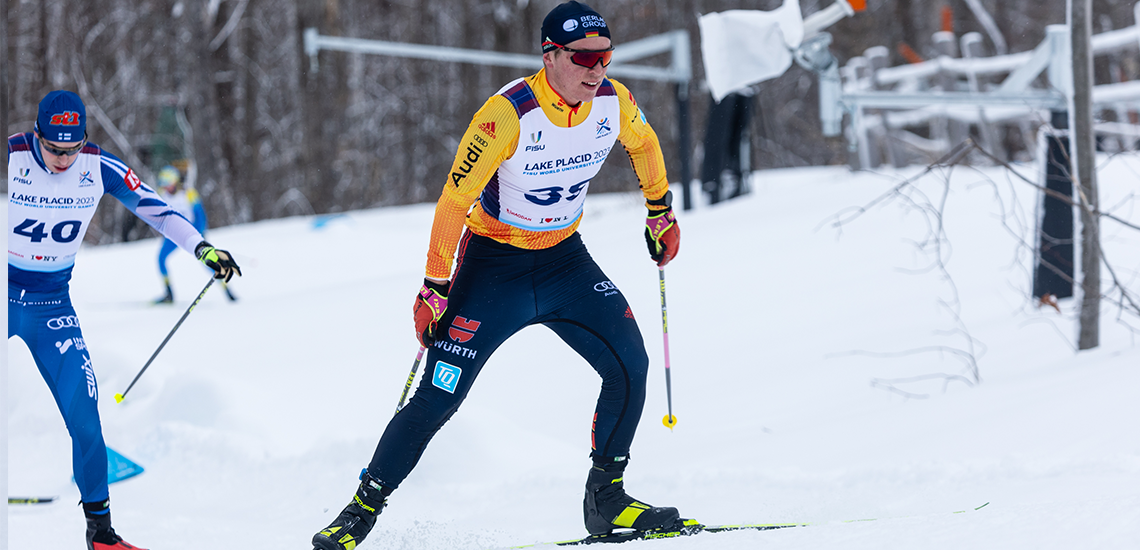For most people trying cross country skiing for the first time, keeping the balance on skis and trying to move is a very demanding task. Now imagine doing the same thing... without seeing anything.
What seems impossible for many is the daily reality for Johanna Recktenwald, a German para-ski athlete guided by compatriot Valentin Haag, who represents their nation in the sport at the Lake Placid 2023 FISU World University Games.
Haag grew up in a sport-driven family in the rural Black Forest region in the south of Germany and has been into skiing since he was a little child, later racing at the national level and competing in national championships. Three years ago, he took an unusual path in his athletic career: he became a para-Nordic skiing guide.
“It was ultimately my dad who got me into it,” Haag explains. “He was a para-Nordic skier himself, competing as a ‘one-pole-athlete’ as he has a handicap on his hand.” Haag soon started pairing up with Recktenwald in both biathlon and cross country races, a combination not unusual in para-sports.
“Starting as a para-guide honestly wasn’t as hard as one might imagine from the outside. You get into it over time. When I first started practicing with Johanna, our coaches literally told me ‘just ski together and Johanna will tell you what she needs.’ ”
Recktenwald has a cone-rod dystrophy, an eye disorder causing a loss of vision. Currently, she has an eyesight of two to three percent left. So, in order to practice her sport, she depends heavily on Haag. “It’s a very demanding day-to-day life for me,” Haag says. “Especially if you are like me – I still like to actively ski race for myself too. So balancing all three components – studying, para-ski guiding and racing for yourself – it’s a lot.”
Haag is currently into his third season as a para-ski guide. “We had a really good start into the para World Cup in Finland last December. We won one silver and two gold medals,” he says. Being a para-ski guide obviously goes hand in hand with a massive amount of responsibility.
“Trying to put yourself into the situation of the handicapped athlete, emphasizing what she can and cannot grasp herself and to know when to give her which information – it’s one of my essential tasks. One of my biggest challenges is whenever there is a course with speedy downhills and steep turns, because it’s tough to keep her staying in the right lane.”
Haag is a second-year embedded systems student, a program combining informatics and micro-electrical engineering at the University of Freiburg in Germany. “I think I’m pretty good in learning effectively for school, but I for sure could do better if I would have more time,” he says. “With everything going on in sports, there are always some things falling behind school-wise.”
Next to being a para-ski guide, competing in the FISU World University Games was a dream Haag had set for himself since he started going to university: “The location here in the US sounded really appealing to me, so once I heard the Games would be in Lake Placid, I was very tempted to go.”
The decision to ultimately come, however, wasn’t an easy one to make: “I was practicing for Lake Placid all year, but then they changed the schedule for the para-ski world championships, so it was overlapping with the FISU Games. I’m glad we found a solution to still make it work. Johanna is now competing with another experienced para-guide at worlds in Östersund, Sweden.”
Haag is in a far different position than most athletes competing at FISU Games yet pleased with his results here: “It’s been my first races as an athlete instead of as a guide this year. So compared to the professionalism of many other athletes competing here, I’m really satisfied with how things went.”
In the cross country relay, the German team came in sixth place, which is “pretty much exactly what we expected we could achieve,” Haag says. “My primary focus is to get all the necessary practice hours with my para-athlete done. So, I have to see how much training I can still squeeze into my own practice schedule. I probably have a lot less training hours than most athletes competing here.”
Haag competed at the 2022 Winter Paralympics with Recktenwald, achieving fourth-place performances in two of the biathlon events. As for the future, he is open minded for everything to come: “Being a para-guide is a very demanding job that ties you in a lot – so I will see how I am going to continue in the future.”
Quelle: FISU / ANNIKA SAUNUS, FISU YOUNG REPORTER
